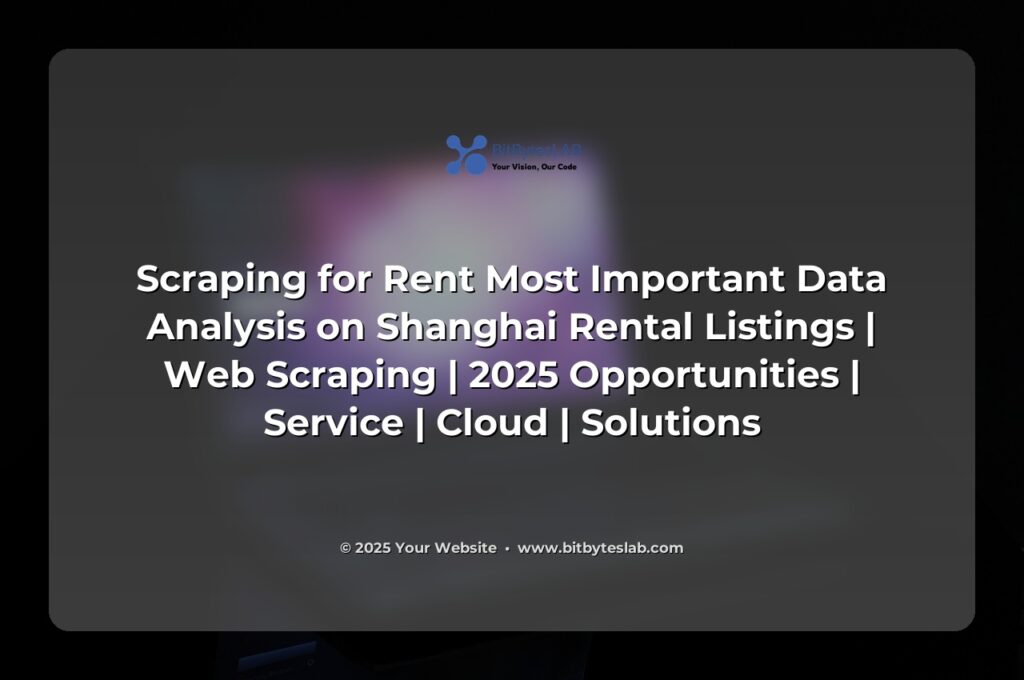Scraping for Rent: The Most Important Data Analysis on Shanghai Rental Listings
Imagine having the power to see every rental price, every floor‑plan, and every neighborhood trend in Shanghai in real time. For data scientists, real‑estate analysts, and SaaS product managers, that’s not a fantasy—it’s a business imperative. In 2025, Shanghai’s rental market is booming, with over 1.2 million new listings surfacing each year and a staggering 30% of the population living in the city’s dynamic core. To stay ahead, you need a pipeline that captures, cleans, and turns that raw data into actionable insights. Let’s dive in.
Problem Identification & Context
For most teams, the first hurdle is the sheer heterogeneity of sources. Popular portals—58.com, Lianjia, Anjuke, Ziroom, and Juwai—each format listings differently, use varied price units, and apply distinct anti‑scraping measures. Coupled with Chinese data protection regulations, building a compliant, scalable scraper feels like navigating a labyrinth. The stakes? Low-quality data leads to mispriced listings, bad forecasts, and lost revenue.
Core Concepts & Methodologies
At the heart of any high‑performance rental scraper lies a robust data model: property ID, address, price (¥), area (m²), bedroom count, posting date, agent details, and source metadata. Coupling this with a clean, versioned storage layer (e.g., PostgreSQL + S3 for raw HTML) ensures traceability and auditability. On the engineering side, a serverless, event‑driven architecture—AWS Lambda or Cloudflare Workers triggered by S3 uploads—offers near‑zero operational overhead while automatically scaling during market peaks.
To stay compliant, always respect robots.txt and terms of service, rotate user agents, and throttle requests. When facing CAPTCHAs or JavaScript challenges, lean on headless browsers with stealth plugins and, if necessary, human‑in‑the‑loop verification—never push your IPs to the brink of a ban.
Finally, embed LLM‑enhanced parsing into your pipeline. A prompt can transform “两室一厅” into a structured 2‑bedroom, 1‑living‑room apartment—saving time and reducing regex errors.
⚡ A SQL query goes into a bar, walks up to two tables and asks… ‘Can I join you?’ 🍺

Expert Strategies & Approaches
1️⃣ Modular Scraper Design—separate fetch, parse, and load into distinct services. This ensures one failing component doesn’t bring down the entire pipeline.
2️⃣ Dynamic Pagination Handling—use Playwright to capture XHR endpoints or scroll events, then replay those requests in a stateless function.
3️⃣ Schema‑Validation First—apply pydantic or marshmallow to every parsed record to catch anomalies early.
4️⃣ Observability & Alerts—instrument with Prometheus metrics, Grafana dashboards, and Slack webhooks for real‑time anomaly detection (e.g., sudden price drop or spike in request latency).
5️⃣ Data Versioning & Lineage—store raw HTML snapshots in S3 with immutable tags, and maintain a change log so analysts can trace why a price changed.
Industry Insights & Trends (2025)
• Browserless Edge Compute is eliminating the need for in‑house clusters. Cloudflare Workers now power instant, low‑latency crawlers that sit closer to the source.
• LLM‑Driven Extraction is no longer a novelty—GPT‑4o and Claude 3.5 can parse unstructured descriptions with >95% accuracy.
• API‑First Real‑Estate Platforms are emerging, yet many critical fields (e.g., interior finishes, neighborhood amenities) remain locked behind the web UI, keeping scraping relevant.
• Data‑as‑a‑Service (DaaS) marketplaces are proliferating. Clean, timestamped Shanghai rental data can command premium pricing for investors and fintechs.
These trends underscore a simple fact: the demand for high‑quality rental data is exploding, and the ability to scrape it responsibly is a competitive advantage.
🚀 Why did the developer go broke? Because he used up all his cache! 💸

Business Applications & ROI
Data-driven rent intelligence translates directly into monetizable services:
- Price‑Trend Forecasting—daily snapshots feed Prophet or XGBoost models, delivering 3‑month price forecasts with 8–10% MAE.
- Competitive Pricing Engine—real‑time dashboards let landlords adjust rents on the fly, boosting occupancy rates by up to 12%.
- Investment Decision Support—Monte‑Carlo simulations on cleaned data empower investors to spot undervalued neighborhoods.
- Fraud & Duplicate Detection—rule‑based alerts flag suspicious listings, saving brokers thousands in potential losses.
For SaaS product managers, a back‑end API that exposes curated rental data yields a recurring revenue stream, while data scientists can unlock insights that shape city‑wide housing policy.
Common Challenges & Expert Solutions
1️⃣ IP Bans—Solution: residential proxy pools + exponential back‑off. 2️⃣ CAPTCHAs—Solution: leverage stealth headless browsers and only resort to human verification when needed. 3️⃣ Schema Drift—Solution: automated visual regression tests that detect DOM changes before breaking selectors. 4️⃣ Legal Compliance—Solution: store only public-facing data, anonymize agent contact info, and maintain a compliance log that auditors can review.
Future Trends & Opportunities
Looking ahead, privacy‑preserving analytics (federated learning, differential privacy) will become mandatory, especially under China’s evolving data protection framework. Hybrid cloud architectures—combining on‑prem data centers for sensitive logs with public cloud for compute—will offer the best of compliance and scalability.
Moreover, the adoption of web3 data marketplaces could democratize access to rental data, pushing developers to create standardized data feeds. For now, the key takeaway is that a well‑architected, compliant scraper is not just a technical asset—it’s a strategic business engine.
Conclusion
In a city where every neighborhood’s vibe can shift within months, having a real‑time, clean, and compliant view of rental listings is indispensable. By embracing modular design, serverless execution, LLM parsing, and robust observability, data teams can transform raw listings into high‑value insights that drive pricing, investment, and policy decisions. If you’re ready to turn Shanghai’s rental chatter into actionable intelligence, BitBytesLab is your go‑to partner for advanced web scraping, data extraction, and cloud‑native solutions.

